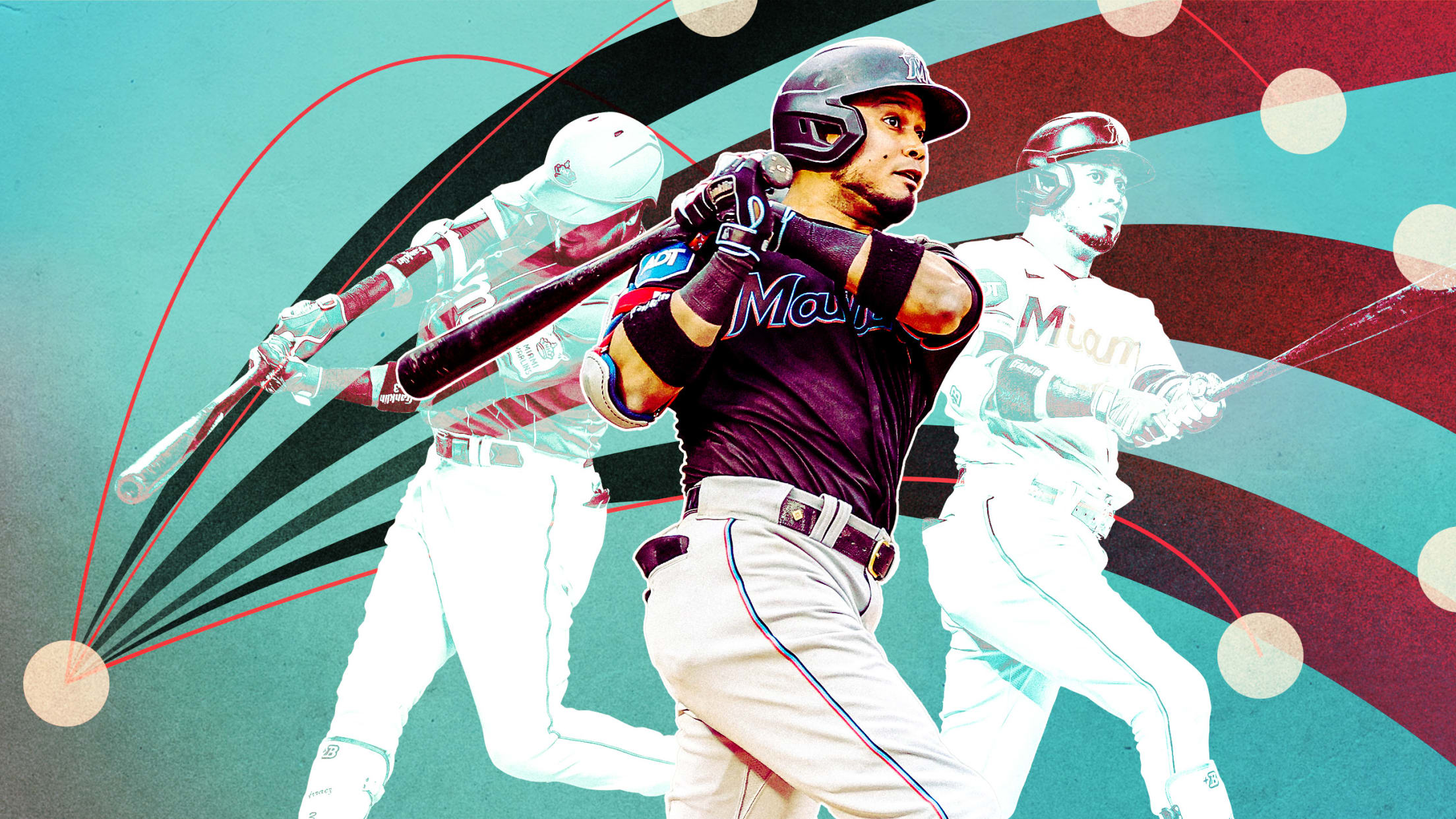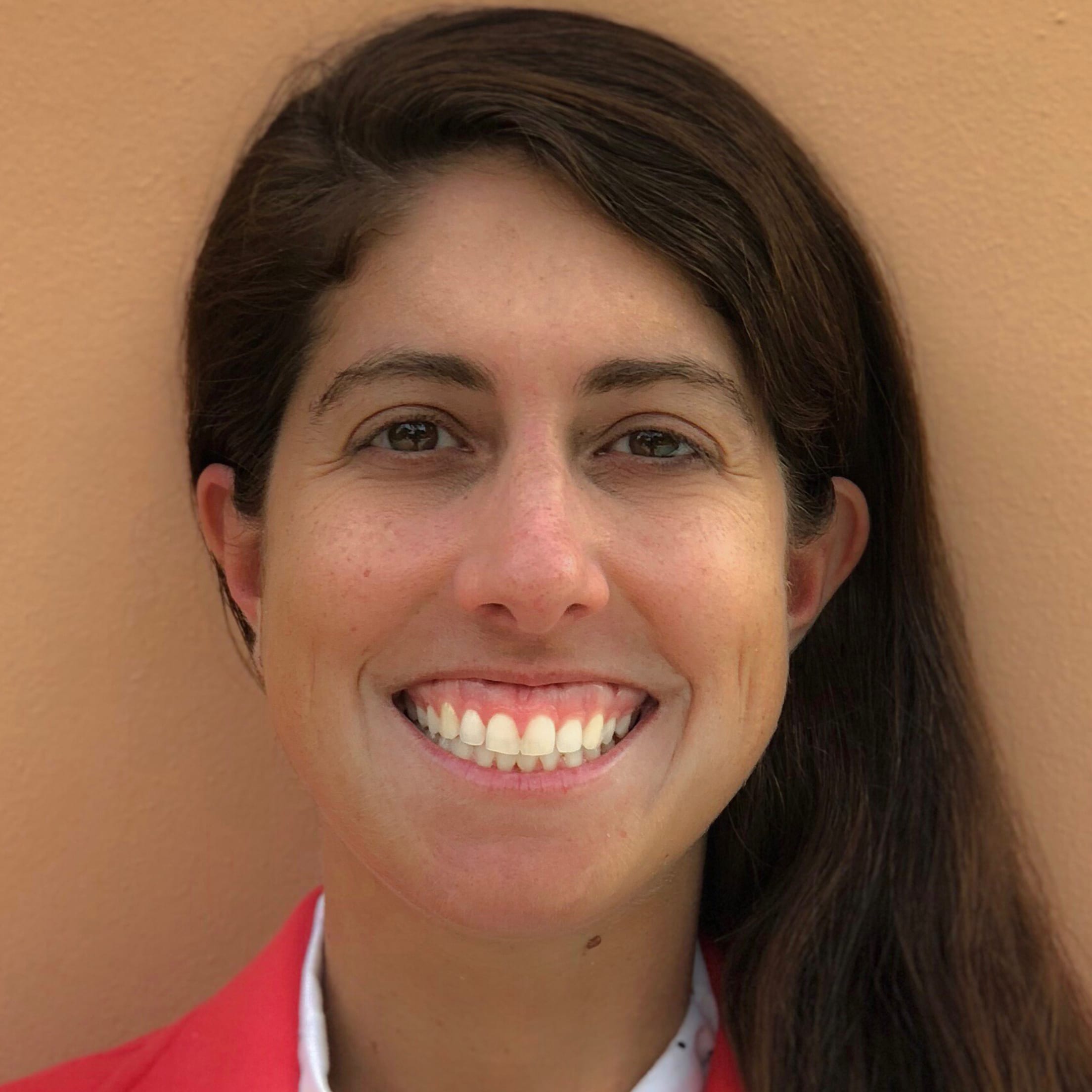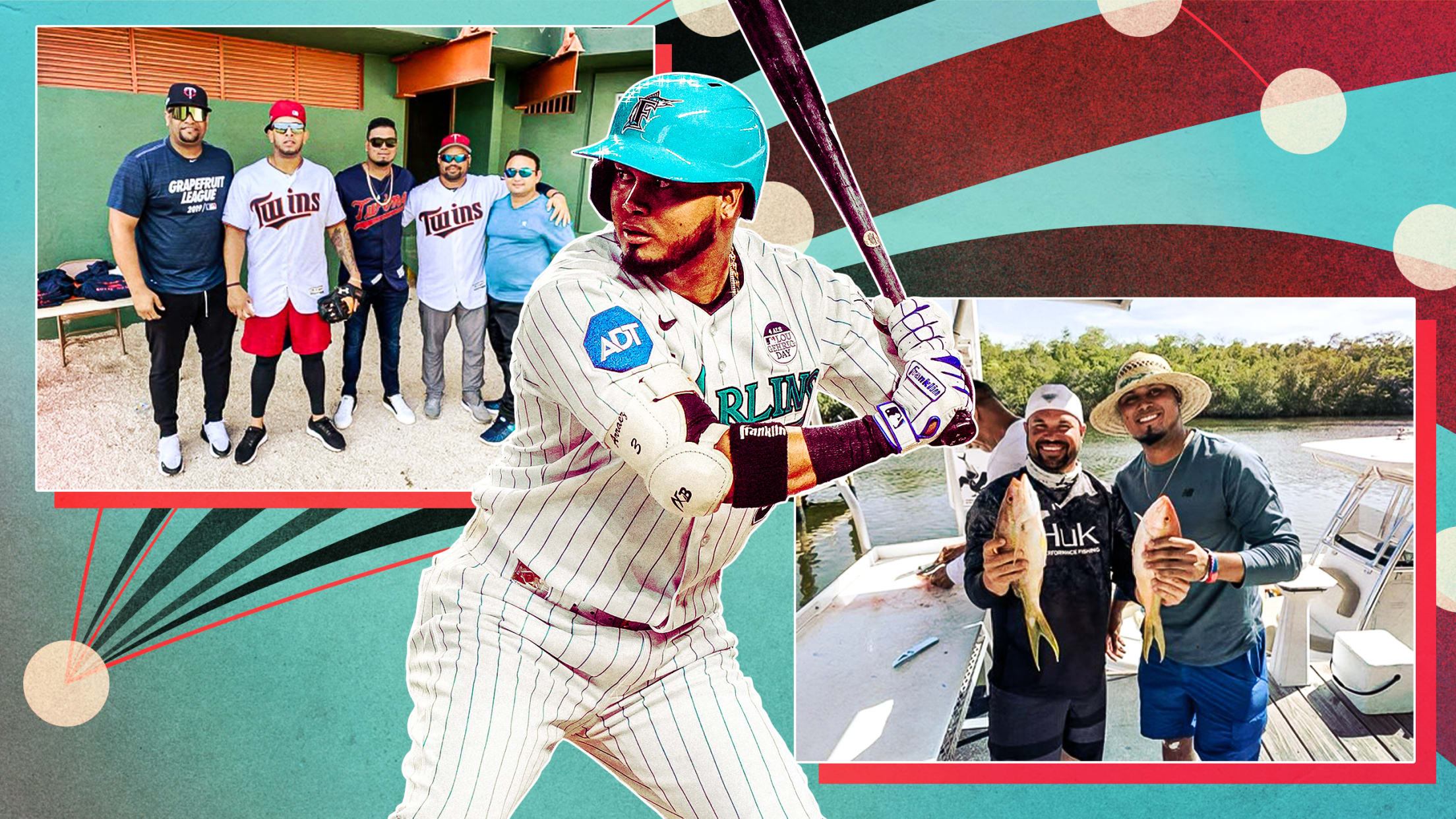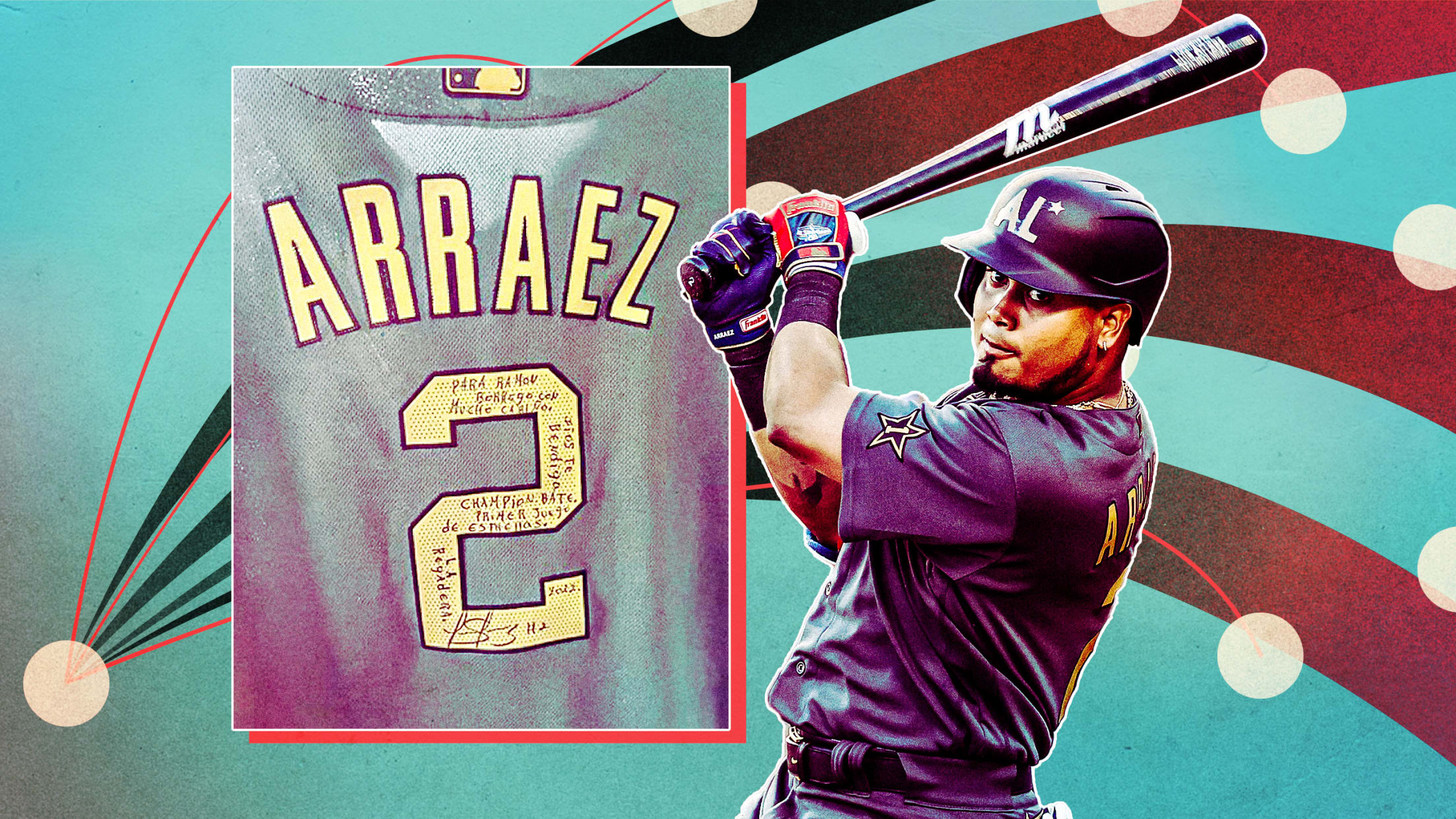
How Arraez went from giving up on baseball to MLB's best hitter

Too slow. Too skinny. No power.
Marlins All-Star second baseman
It all began when Arraez, a natural righty, would pick up his plastic bat left-handed to strike a ball hung from the family's mango tree. His father, Ernesto, taught him to swing for left field, where he insisted hits could be found. That mentality transformed Luis into "La Regadera" or "The Sprinkler," spraying balls across the field.
"I said, 'OK, if you're going to hit lefty, just stick to it,'" Ernesto said via Marlins interpreter Luis Dorante Jr. "I taught him how to catch the ball, how to field before he was part of the league, because when we were going to sign him up, the tournament already started, so we needed to find time. I used to finish work at 6 [p.m.] from driving as a bus driver, and then dedicated two to four hours with him practicing after work."
Arraez was the best hitter from the moment he started organized baseball at the age of 8. He soon began training at the Felix Olivo Academy in Valencia, where he competed for Venezuela in international tournaments. At 15 years old, Arraez pitched seven innings to beat Brazil in a competition held in Mexico. While many of the players had agreed to high signing bonuses with MLB clubs by this time, Arraez remained unsigned.
Little did Arraez know that José León, then coordinator of scouting for the Twins in Venezuela, was impressed by what he saw. León soon invited Arraez to the Twins' Academy, at the time located in Bejuma, Venezuela, for likely his last chance at a professional baseball career. Two months later, León informed Arraez that there was no money to sign him, so the teenager resigned himself to a life without baseball.
"I went home and I said, 'Mom, sorry, but I don't want to play anymore baseball. I want to go to the school now and focus as a student,'" Arraez recalled.
Luckily for Arraez, León fought for him -- a common theme among his greatest supporters and mentors. León later met with the Arraez family, gathering for a meal of soup and arroz con coco, when he offered a contract worth $40,000. Arraez signed on Nov. 6, 2013.
"He had fallen into depression after that, didn't want to do anything at all," his mother Maria said, with Dorante interpreting. "I told him that he was going to sign, to trust God that he was going to sign, trust himself. But there was nothing to get him up. His older brother one time took him out to the fields to talk. I don't know exactly what they talked about, but when he came back, he was a little more happy. Luis said it didn't matter much [about] the money, but he wanted to just show his talent, which is the most important thing."

And that Arraez did. His professional debut in 2014 was exactly what you might expect with the benefit of hindsight. He batted .348 with no homers and walked more than he struck out in 31 Dominican Summer League games. When it came time for Arraez to move stateside, DSL manager Jimmy Alvarez reached out to Ramon Borrego, then the third-base coach for the Gulf Coast League Twins, and told him to be on the lookout for Arraez.
It didn't take long for Borrego to believe in Arraez's potential. In his first at-bat, Arraez quickly fell behind with two strikes only to foul off 12 pitches and then send a sharp line drive down the left-field line. It was quintessential Arraez.
Batting was clearly Arraez's strength, so Borrego implemented a routine to clean up his defense. Arraez moved from shortstop to second base, which gave him a shorter throw and more time to transfer the ball.
"If I was a manager, I would love to have nine Luis Arraezes playing in the field," Borrego said. "I'm going to win a lot of World Series. It's because he plays with passion, he cares, every little detail. He wants to win, and he's all about it."
Despite his production, Arraez encountered more detractors. He wasn't among the prospects invited to the fall instructional league in 2015. Once again, he needed someone to vouch for him. This time, it was Borrego, who had been given the responsibility of handing out the invitations. Borrego convinced the front office to include Arraez. The following spring, Borrega learned Arraez was going to be sent back to Rookie-level ball and pleaded his case for a promotion.
Arraez went on to win the 2016 Midwest League batting title with a .347 average at Single-A Cedar Rapids, becoming Minnesota's No. 28 prospect per MLB Pipeline. Unfortunately, Arraez would play in just three games at High-A Fort Myers in '17 after undergoing right ACL surgery. Upon his return in '18, Arraez combined to hit .310 between Fort Myers and Double-A Chattanooga. But the Twins sent him back to the Double-A level in '19, something he didn't want.
"Your journey in this profession has been so hard since Day 1 that you signed, so be patient," Borrego told him. "That's the best to do. Be patient, wait for your chance. Don't put pressure on yourself and play the game the way you're playing."
Arraez spent 38 games at Double-A Pensacola before joining Triple-A Rochester, where he lasted just 16 games. With Nelson Cruz landing on the injured list, Arraez received his first Major League callup as Minnesota's corresponding move and made his debut on May 18, 2019. From 2019-21, Arraez hit .313 in 245 games but twice missed time with knee injuries.

Arraez wasn't satisfied, so he asked Cruz if he could train during the 2021-22 offseason at his home in the Dominican Republic. A four-time Silver Slugger and seven-time All-Star during a 19-year career, Cruz preached the importance of taking care of one's body, eating healthier and getting stronger. Workouts began at 8 a.m. inside the cage before taking the field for ground balls and running. They would return to the gym to work out from 1:30-2 p.m. After a siesta, it was more hitting at night. They followed this schedule every day, including Sundays. During the first workout, Arraez threw up because he wasn't used to the intensity.
Around this time, Cruz also introduced Arraez to his personal hitting coach, Frank Valdez, who has had a facility in Miami for 21 years. To this day, Valdez and Arraez spend 15-20 minutes on a daily hitting routine -- regardless of whether he's on the road or at home -- that includes tee work with a small and normal-sized bat.
"He left his family behind, everything, to just get better, and he lost like 20 pounds and got some muscles and his body started to change," Cruz said. "And then the last year, obviously, his body was totally different than the year before. Now, he's getting muscle and getting stronger.
"I'm really proud of the way he has been taking care of himself. He's matured through the years, and even more this year. He's a leader in the clubhouse and field. You can see the way he carries himself on and off the field. He always asked me how he can get better. You don't see that very often. I told him, 'The same thing that I'm doing for you, help you with not only information or whatever -- I think life in general -- you have to do it for somebody else. If you see somebody that needs help, just go and grab him and bring in the help that they need. That's the only thing that I ask.'"

The hard work quickly paid dividends for Arraez, who made the 2022 All-Star team, won the AL batting title (.316) and received an AL Silver Slugger Award. Coming off a career year, Arraez never thought the organization that gave him a chance as a 16-year-old and developed him would trade him. But that's exactly what happened this past January in a deal that included right-hander Pablo López.
General manager Kim Ng, looking for ways to upgrade the offense, wanted to add a pure hitter. Arraez fit that mold. His Statcast metrics in categories like exit velocity didn't jump off the page, but his strike-zone recognition and swing decisions were unmatched.
Cruz had heard rumblings that a trade was impending. It was confirmed when he saw a bunch of calls from the Twins.
"I told the Twins, 'I faced Pablo, he's a great, great pitcher, no doubt, and I think you guys need pitching, everybody needs pitching, but Arraez, he's good, he's ready, his body is stronger,'" Cruz said. "'If you can stop the trade, do it.'"
But the trade was completed, and Arraez has taken his game to another level in 2023, flirting with a .400 batting average into the Midsummer Classic and making a second consecutive All-Star team. Once considered a defensive liability, he has six defensive runs saved as the everyday second baseman for the first time in his career.
Most importantly, underdog Miami remains in the thick of the NL Wild Card race thanks to Arraez's contributions.
"Our team is sort of an enigma, and he fits right in there," Ng said. "He's just not necessarily what our game values immensely today. But I think he's definitely opened some eyes. He's just one of those guys that, until you see him every day, whether it's on the field or off the field, how he approaches his workout here, seeing him in the clubhouse, [he's] just always up. He's sort of this love-of-life kind of guy. He's been just such a great add for the demeanor and the personality of our team."
Every time Arraez takes the field, there's a chance at history. He recorded the franchise's first cycle in April and a trio of five-hit games within a two-week span. His trajectory seemed improbable to many, but not to him or his family -- who will get to see him play in person for the first time this weekend in Miami.
"Because I work hard for this and I trust myself," Arraez said. "When I wake up, I say, 'Hey, you can do this. You can do this, and I'll go forward.' This is a big season for me. Baseball is hard, but I just come here and enjoy the game."

